新视野英语教程第三册全部教案
- 格式:doc
- 大小:273.00 KB
- 文档页数:50
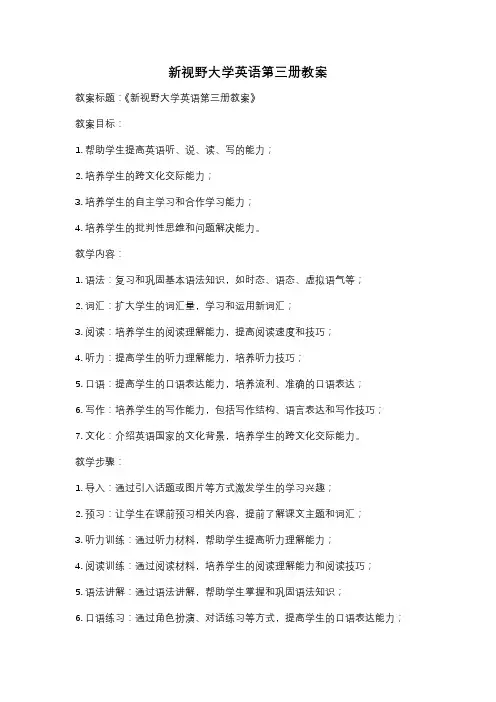
新视野大学英语第三册教案教案标题:《新视野大学英语第三册教案》教案目标:1. 帮助学生提高英语听、说、读、写的能力;2. 培养学生的跨文化交际能力;3. 培养学生的自主学习和合作学习能力;4. 培养学生的批判性思维和问题解决能力。
教学内容:1. 语法:复习和巩固基本语法知识,如时态、语态、虚拟语气等;2. 词汇:扩大学生的词汇量,学习和运用新词汇;3. 阅读:培养学生的阅读理解能力,提高阅读速度和技巧;4. 听力:提高学生的听力理解能力,培养听力技巧;5. 口语:提高学生的口语表达能力,培养流利、准确的口语表达;6. 写作:培养学生的写作能力,包括写作结构、语言表达和写作技巧;7. 文化:介绍英语国家的文化背景,培养学生的跨文化交际能力。
教学步骤:1. 导入:通过引入话题或图片等方式激发学生的学习兴趣;2. 预习:让学生在课前预习相关内容,提前了解课文主题和词汇;3. 听力训练:通过听力材料,帮助学生提高听力理解能力;4. 阅读训练:通过阅读材料,培养学生的阅读理解能力和阅读技巧;5. 语法讲解:通过语法讲解,帮助学生掌握和巩固语法知识;6. 口语练习:通过角色扮演、对话练习等方式,提高学生的口语表达能力;7. 写作训练:通过写作练习,培养学生的写作能力和写作技巧;8. 小组讨论:组织学生进行小组讨论,培养学生的合作学习能力和批判性思维;9. 总结与复习:总结本节课的重点内容,并进行复习。
教学评估:1. 课堂表现:观察学生在课堂上的参与度、表达能力和合作精神;2. 作业评估:批改学生的作业,评估学生的语言运用和写作能力;3. 考试评估:通过考试测试学生的听、说、读、写能力。
教学资源:1. 教材:《新视野大学英语第三册》教材及配套练习册;2. 多媒体设备:投影仪、电脑等用于播放听力和展示教学资源;3. 音频材料:提供课堂听力训练和学生自主听力训练的音频材料;4. 练习题:准备相关的练习题,用于课堂练习和作业。
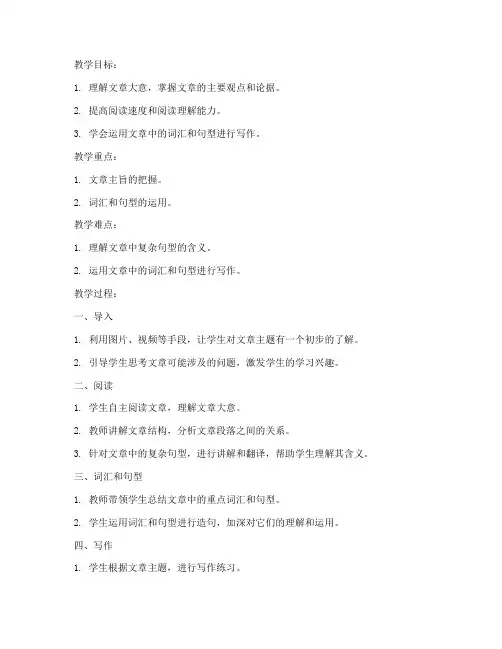
教学目标:1. 理解文章大意,掌握文章的主要观点和论据。
2. 提高阅读速度和阅读理解能力。
3. 学会运用文章中的词汇和句型进行写作。
教学重点:1. 文章主旨的把握。
2. 词汇和句型的运用。
教学难点:1. 理解文章中复杂句型的含义。
2. 运用文章中的词汇和句型进行写作。
教学过程:一、导入1. 利用图片、视频等手段,让学生对文章主题有一个初步的了解。
2. 引导学生思考文章可能涉及的问题,激发学生的学习兴趣。
二、阅读1. 学生自主阅读文章,理解文章大意。
2. 教师讲解文章结构,分析文章段落之间的关系。
3. 针对文章中的复杂句型,进行讲解和翻译,帮助学生理解其含义。
三、词汇和句型1. 教师带领学生总结文章中的重点词汇和句型。
2. 学生运用词汇和句型进行造句,加深对它们的理解和运用。
四、写作1. 学生根据文章主题,进行写作练习。
2. 教师对学生的写作进行点评,指出优点和不足,并提出改进建议。
五、课堂小结1. 教师总结本节课的学习内容,强调重点和难点。
2. 学生回顾本节课所学知识,加深对文章主题的理解。
教学资源:1. 教材:《新视野大学英语读写教程》第三册2. 图片、视频等辅助教学材料3. 网络资源教学评价:1. 课堂参与度:观察学生在课堂上的发言、提问等表现。
2. 阅读理解能力:通过课堂提问、小组讨论等方式,了解学生对文章的理解程度。
3. 写作能力:对学生的写作练习进行评价,了解其在词汇和句型运用方面的掌握程度。
教学反思:1. 根据学生的反馈,调整教学方法和手段,提高教学效果。
2. 关注学生的学习需求,有针对性地进行教学。
3. 注重培养学生的阅读兴趣和写作能力,提高学生的英语综合素质。
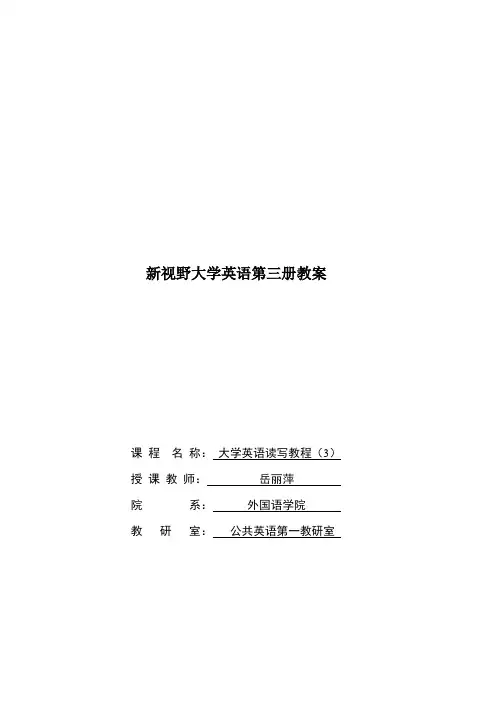
新视野大学英语第三册教案课程名称:大学英语读写教程(3)授课教师:岳丽萍院系:外国语学院教研室:公共英语第一教研室1.Preparation1.1 Background informationTwin towers of the World Trade Center burning.Location New York City; Arlington County, Virginia; and near Shanksville, Pennsylvania.Date Tuesday, September 11, 2001 8:46 am – 10:28 am (UTC-4)Attack type Aircraft hijacking, mass murder, suicide attack, TerrorismDeath(s) 2,976 victims and 19 hijackers Injured 6,000+Belligerent(s) al-Qaeda(基地组织) led by Osama bin Laden, see also Responsibility and Hijackers.The September 11 attacks (often referred to as September 11th or 9/11) were a series of coordinated suicide attacks by al-Qaeda upon the United States on September 11, 2001. On that morning, 19 al-Qaeda terrorists hijacked four commercial passenger jet airliners. The hijackers intentionally crashed two of the airliners into the Twin Towers of the World Trade Center in New York City, killing everyone on board and many others working in the buildings. Both buildings collapsed within two hours, destroying nearby buildings and damaging others. The hijackers crashed a third airliner into the Pentagon(五角大楼)in Arlington, Virginia, just outside Washington, D.C. The fourth plane crashed into a field near Shanksville in rural Pennsylvania after some of its passengers and flight crew attempted to retake control of the plane, which the hijackers had redirected toward Washington, D.C. There were no survivors from any of the flights.The death toll of the attacks was 2,995, including the 19 hijackers. The overwhelming majority of casualties were civilians, including nationals of over 70 countries. In addition, there is at least one secondary death – one person was ruled by a medical examiner to have died from lung disease due to exposure to dust from the World Trade Center's collapse.The United States responded to the attacks by launching the War on Terrorism. It invaded Afghanistan to depose the Taliban, who had harbored al-Qaeda terrorists. The United States also enacted the USA PATRIOT Act(爱国者法案). Many other countries also strengthened their anti-terrorism legislation and expanded law enforcement powers. Some American stock exchanges stayed closed for the rest of the week following the attack and postedenormous losses upon reopening, especially in the airline and insurance industries. The destruction of billions of dollars worth of office space caused serious damage to the economy of Lower Manhattan(曼哈顿下城). The damage to the Pentagon was cleared and repaired within a year, and the Pentagon Memorial was built adjacent to the building. The rebuilding process has started on the World Trade Center site. In 2006 a new office tower was completed on the site of 7 World Trade Center. 1 World Trade Center is currently under construction at the site and, at 1,776 ft (541 m) upon completion in 2013, it will become one of the tallest buildings in North America. Three more towers were originally expected to be built between 2007 and 2012 on the site. Ground was broken for the Flight 93 National Memorial on November 8, 2009, and the first phase of construction is expected to be ready for the 10th anniversary of the attacks on September 11, 2011.1.2. Topic-related discussionStep 1. Group workStudents can work in group by discussing the following questions.1.What is ―love‖ like in your mind?e one word or one thing to describe ―love‖. And why is that? Share your thoughts with your groupmembers.Step 2. PresentationA representative from eac h group is going to show the group’s idea after the discussion.2. In-class reading2.1 Text understandingStep 1. Pre-readingAsk students to skim the text in ten minutes.Step 2. Question askingQ1. How did Jimmy get his brain damaged?Q2. How did the writer describe her father?Q3. How much was Jimmy changed after his father’s death?Q4. What did the writer think of her caring for Jimmy?Q5. Why did the writer invite her friends to Jimmy’s birthday party?Q6. What did the party remind the writer and her friends of?2.2. Words and phrases1. delivery n.1. [C] the process of giving birth to a baby 分娩With the help of the nurses, the delivery of the baby was unexpectedly easy.在护士的帮助下,分娩意外地顺利。
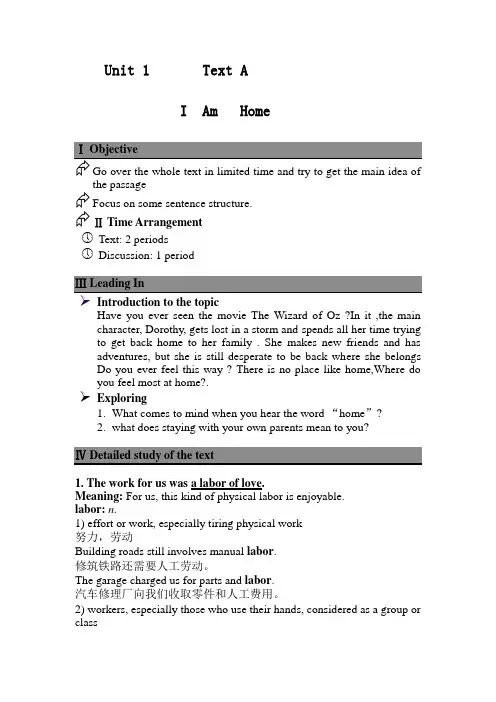
Unit 1 Text AI Am HomeⅠ ObjectiveG o over the whole text in limited time and try to get the main idea ofthe passageF ocus on some sentence structure.Ⅱ Time ArrangementText: 2 periodsDiscussion: 1 periodⅢ Leading InIntroduction to the topicHave you ever seen the movie The Wizard of Oz ?In it ,the main character, Dorothy, gets lost in a storm and spends all her time trying to get back home to her family . She makes new friends and has adventures, but she is still desperate to be back where she belongs Do you ever feel this way ? There is no place like home,Where do you feel most at home?.Exploring1.What comes to mind when you hear the word “home”?2.what does staying with your own parents mean to you?1. The work for us was a labor of love.Meaning: For us, this kind of physical labor is enjoyable.labor:n.1) effort or work, especially tiring physical work努力,劳动Building roads still involves manual labor.修筑铁路还需要人工劳动。
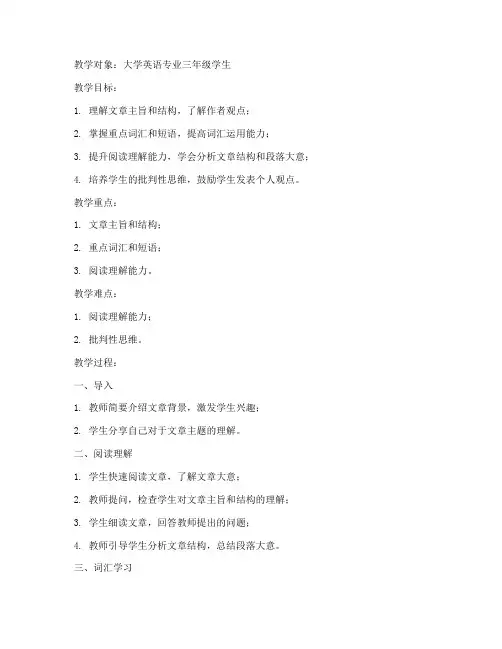
教学对象:大学英语专业三年级学生教学目标:1. 理解文章主旨和结构,了解作者观点;2. 掌握重点词汇和短语,提高词汇运用能力;3. 提升阅读理解能力,学会分析文章结构和段落大意;4. 培养学生的批判性思维,鼓励学生发表个人观点。
教学重点:1. 文章主旨和结构;2. 重点词汇和短语;3. 阅读理解能力。
教学难点:1. 阅读理解能力;2. 批判性思维。
教学过程:一、导入1. 教师简要介绍文章背景,激发学生兴趣;2. 学生分享自己对于文章主题的理解。
二、阅读理解1. 学生快速阅读文章,了解文章大意;2. 教师提问,检查学生对文章主旨和结构的理解;3. 学生细读文章,回答教师提出的问题;4. 教师引导学生分析文章结构,总结段落大意。
三、词汇学习1. 教师带领学生分析文章中的重点词汇和短语;2. 学生分组进行词汇练习,巩固所学知识;3. 教师点评学生的练习,纠正错误。
四、写作练习1. 教师给出写作题目,要求学生根据文章内容进行写作;2. 学生进行写作,教师巡视指导;3. 学生展示自己的作品,教师点评并提出修改意见。
五、课堂小结1. 教师总结本节课的学习内容,强调重点;2. 学生分享自己的学习心得。
六、课后作业1. 学生完成课后阅读练习;2. 学生根据文章主题,写一篇短文。
教学反思:本节课通过阅读理解、词汇学习和写作练习,帮助学生掌握文章主旨和结构,提高词汇运用能力。
在教学过程中,注重培养学生的批判性思维,鼓励学生发表个人观点。
同时,关注学生的个体差异,因材施教,提高教学效果。
在今后的教学中,将继续关注学生的阅读理解能力和写作能力,帮助学生提高英语水平。
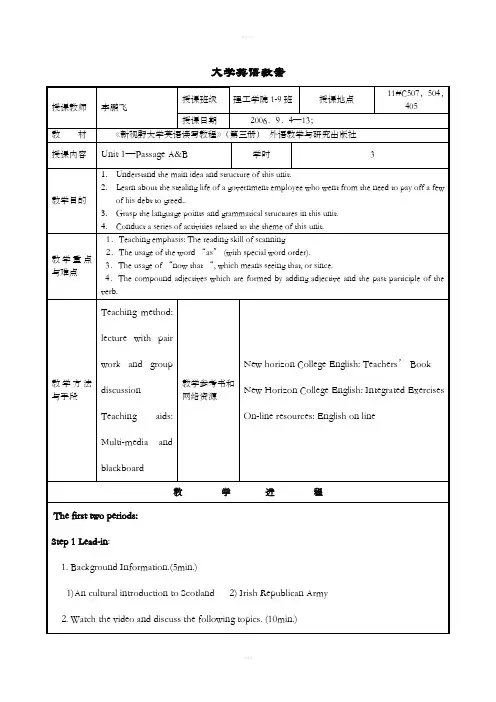
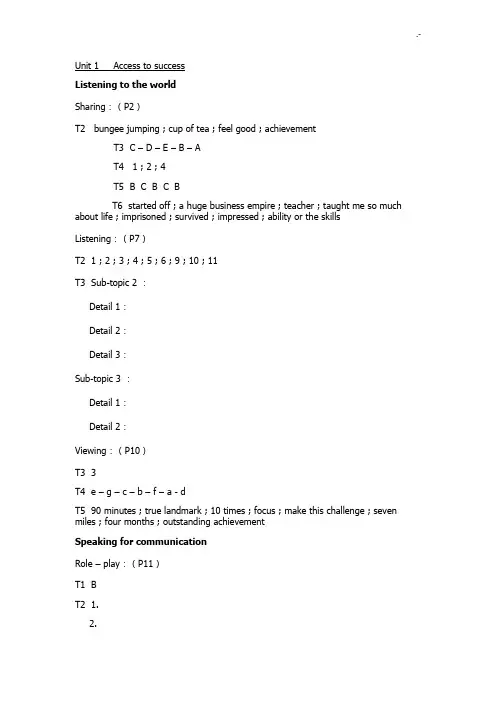
Unit 1 Access to successListening to the worldSharing:(P2)T2 bungee jumping ; cup of tea ; feel good ; achievementT3 C – D – E – B – AT4 1 ; 2 ; 4T5 B C B C BT6 started off ; a huge business empire ; teacher ; taught me so much about life ; imprisoned ; survived ; impressed ; ability or the skills Listening:(P7)T2 1 ; 2 ; 3 ; 4 ; 5 ; 6 ; 9 ; 10 ; 11T3 Sub-topic 2 :Detail 1:Detail 2:Detail 3:Sub-topic 3 :Detail 1:Detail 2:Viewing:(P10)T3 3T4 e – g – c – b – f – a - dT5 90 minutes ; true landmark ; 10 times ; focus ; make this challenge ; seven miles ; four months ; outstanding achievementSpeaking for communicationRole – play:(P11)T1 BT2 1.2.3.4.T3 Like I said ; having said that ; That’ s what I was sayingGroup discussion:(P13)T1 1.2.3.4.5.T2T3Public speaking:(P18)TFurther practice in listening(P19)Short conversations: B C A D CLong conversation:B A A CPassage 1: D C A BPassage 2:believe in ; circumstances ; searching for ; a strong sense of ; responsibility ; insecurity ; integrity ; accomplishing ; are longing for ; priorities News(Unipus)News report 1News report 2Assessment (Unipus)Unit test:Part 1 B C A D CPart 2 D A B C CPart 3 B C A A DPart 4 opening ; struggled ; progress ; remaining ; emerged ; continued ; enlarge ; crawling ; get through ; as strong asUnit 2 Emotions speak louder than wordsListening to the worldSharing:(P25)T2 mood ; sun ; smile ; feelingT3 b – e – a – d - cT4 3 ; 5T5 success of the business ; last June ; vegetables and flowers ; visit my father ; amazing sights ; applicants ; getting a jobListening:(P29)T2 1. people are getting angrier ; controlling their temper2. leave us feeling angry3. in a controlled way4. feel much better5. laughter therapy ; they make them laugh ; doing something funny6. they don't need medicineT4 1 ; 4Viewing:(P30)T2 1.eager ; pleased 2.nervous ; awkward 3.expectant ; excited 4.agitated ; contentedT3 1.2.3.4.5.Speaking for communicationRole – play:(P32)T1T2T3Group discussion:(P35)T1T2T3Public speaking:(P39)TFurther practice in listening(P41)Short conversations: D C A A DLong conversation:C B A DPassage 1: B C A APassage 2:exerting ; fabulous ; talk them out ; approaches ; head for ; efficient ; is linked with ; compare favorably to ; boost ; sessionNews(Unipus)News report 1News report 2Assessment (Unipus)Unit test:Part 1 C D A A CPart 2 B C C B CPart 3 A D B A APart 4 at ; wheel ; tone ; expression ; Honey ; divorce ; speed ; talk me out ; bank accounts ; everything I needUnit 3 Love your neighborListening to the worldSharing:(P46)T2 block ; a few of ; similar ; quite a lot ; wellT3 b – d – a - cT4 1A ; 2D ; 3D ; 4E ; 5B ; 6D ; 7A ; 8C ; 9A ; 10DT5 exist as well ; loud music ; respecting privacy ; participating ; needs help ; considerate ; property ; friendlyT6 2 ; 3Listening:(P51)T3 1.2.3.4.5.6.Viewing:(P53)T3 e – a – f – b – d - cT4 A A B CSpeaking for communicationRole – play:(P54)T1T2T3Group discussion:(P56)T1T2T3T4Public speaking:(P62)T3Further practice in listening(P63)Short conversations: D B C B CLong conversation:C B C BPassage 1: B D C DPassage 2:illegal ; taking family vacations ; acquaintances ; throwing a party ; verbal ; tolerant ; intervene ; splits the difference ; resolve ; take it outNews(Unipus)News report 1:News report 2:Assessment (Unipus)Unit test:Part 1 A C A C BPart 2 B B D A CPart 3 C B D D DPart 4 winter ; literally ; community ; winder ; siblings ; woods ; explore ; catching ; would run ; golf courseUnit 4 What’s the big idea?Listening to the worldSharing:(P69)T2 c – d – a - bT3 2 ; 3 ; 4 ; 5T4 amazing ; changed my life ; mobile phone ; emails ; camera ; taking a picture ; fantasy ; cakes ; arts ; creativityListening:(P73)T3 1. cheaper 2. better 3. oil 4. sad 5. safety 6. appetite 7. precision 8. precisionT4 Which soft drink ; want things ; how consumers behave ; above ; a bigger share ; small ; I deserve the best ; steam ; cigarette smoke ; smile ; a tick symbol ; positive ; built-in associations ; sports equipmentViewing:(P76)T2 A B CT3 1.2.3.4.5.Speaking for communicationRole – play:(P77)T3 1. 2. 3. 4. 5. 6.1. 2. 3. 4. 5. 6.Group discussion:(P79)T1T2T3Public speaking:(P84)T3T4Further practice in listening(P85)Short conversations: D B C A DLong conversation:B C D BPassage 1: B C A DPassage 2:vary ; a large portion of ; well-being ; profound ; accessible ; ultimately ; have a harmful effect on ; went against ; aviation ; is not worth pursuingNews(Unipus)News report 1News report 2Assessment (Unipus)Unit test:Part 1 B C A C DPart 2 C C D A DPart 3 D A B A APart 4 biological ; firmly ; efforts ; isolation ; objectors ; originality ; modest ; improve the health ; morally ; legislationUnit 5 More than a paycheckListening to the worldSharing:(P91)T2 producer ; enjoys ; in a successful band ; dream jobsT3 1 ; 2 ; 3 ; 8 ; 9 ; 11T4 footballer ; enough ; professional ; performing ; band ; world-famous ; sports ; later on ; serving peopleT5 e – b – a – d – cT6 1 ; 4Listening:(P94)T2 B – C - AT3T 4Viewing:(P98)T3 B D B DSpeaking for communicationRole – play:(P99)T1T2Group discussion(Presenting):(P102)T1T2T3T4Public speaking:(P106)TFurther practice in listening(P)Short conversations: B B A D CLong conversation:B A B DPassage 1: D A B DPassage 2:suffer from ; enthusiastic ; erodes ; competent ; clear-cut ; labeling ; comes down to ; commonplace ; tend to ; focusing onNews(Unipus)News report 1News report 2Assessment (Unipus)Unit test:Part 1 A D A D DPart 2 D C A B BPart 3 A C A A DPart 4 predict ; identical ; typical ; boring ; variety ; dangerous ; normal ; some robbers ; captured ; right thereListening to the worldSharing:(P)T2T3T4T5Listening:(P)T2 1.3.4.5.6.T4Viewing:(P)T2T3 1.2.3.4.5.Speaking for communication Role – play:(P)T1T2T3Group discussion:(P)T1T2T3Public speaking:(P)TFurther practice in listening(P)Short conversations:Long conversation:Passage 1:Passage 2: nNews(Unipus)News report 1News report 2 Assessment (Unipus)Unit test:Part 1Part 2Part 3Part 4Listening to the world Sharing:(P)T2T3T4T5Listening:(P)T2 1.2.3.4.5.6.T4Viewing:(P)T2T3 1.3.4.5.Speaking for communication Role – play:(P)T1T2T3Group discussion:(P)T1T2T3Public speaking:(P)TFurther practice in listening(P)Short conversations:Long conversation:Passage 1:Passage 2: nNews(Unipus)News report 1News report 2Assessment (Unipus)Unit test:Part 1Part 2Part 4TTT。

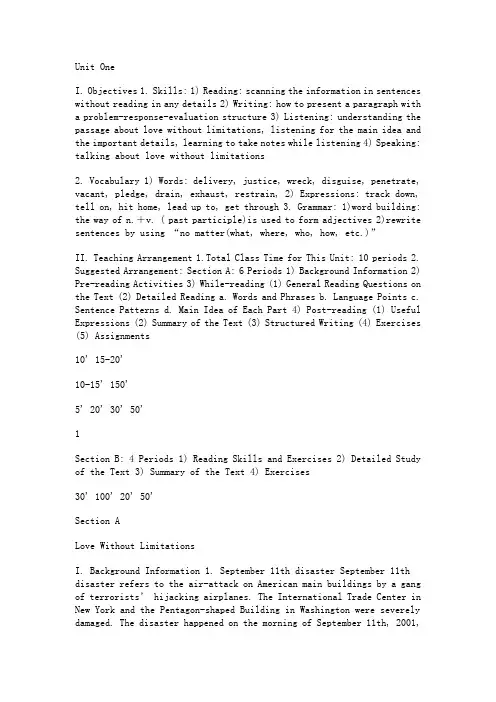
Unit OneI. Objectives 1. Skills: 1) Reading: scanning the information in sentences without reading in any details 2) Writing: how to present a paragraph with a problem-response-evaluation structure 3) Listening: understanding the passage about love without limitations, listening for the main idea and the important details, learning to take notes while listening 4) Speaking: talking about love without limitations2. Vocabulary 1) Words: delivery, justice, wreck, disguise, penetrate, vacant, pledge, drain, exhaust, restrain, 2) Expressions: track down, tell on, hit home, lead up to, get through3. Grammar: 1)word building: the way of n.+v. ( past participle)is used to form adjectives 2)rewrite sentences by using “no matter(what, where, who, how, etc.)”II. Teaching Arrangement 1.Total Class Time for This Unit: 10 periods 2. Suggested Arrangement: Section A: 6 Periods 1) Background Information 2) Pre-reading Activities 3) While-reading (1) General Reading Questions on the Text (2) Detailed Reading a. Words and Phrases b. Language Points c. Sentence Patterns d. Main Idea of Each Part 4) Post-reading (1) Useful Expressions (2) Summary of the Text (3) Structured Writing (4) Exercises (5) Assignments10' 15-20'10-15' 150'5' 20' 30' 50'1Section B: 4 Periods 1) Reading Skills and Exercises 2) Detailed Study of the Text 3) Summary of the Text 4) Exercises30' 100' 20' 50'Section ALove Without LimitationsI. Background Information 1. September 11th disaster September 11th disaster refers to the air-attack on American main buildings by a gang of terrorists’ hijacking airplanes. The International Trade Center in New York and the Pentagon-shaped Building in Washington were severely damaged. The disaster happened on the morning of September 11th, 2001,American east time. The result was that six symbolical skyscrapers were hit, including the International Trade Center in New York and the Pentagon-shaped Building in Washington; other 23 buildings were destroyed to some degree. Altogether 2998 people lost their lives. The air-attack was the most frightening since World II and it also aroused great terror throughout the world. From then, nations around the world realized the importance of resistance against terrorism and the cooperation in the fight against terrorism. 2. Brain damage: Brain damage is caused by external violence on head or by lacking of oxygen during a difficult delivery. The average death rate of it is between 4 percent to 7 percent, sometimes up to 50 or 60 percent. It can be grouped into two categories: closed-damage and opened-damage. Cerebral concussion is the most common one. Doctors have developed a lot of experience in treating brain damage. If a patient suffers from brain damage, it is more difficult for him to study and live normally. II. Pre-reading Activities Listening and Discussing 1. First Listening Listen to a passage about love without limitations. 2. Second Listening Listen to the passage again and answer the following questions. The last question is open-ended and may have different answers.21) Why didn’t the speaker’s brother have the chance to go to a regular school or compete for a decent job? Because he was born with brain damage and learning was a challenge for him. 2) Wh at did the speaker’s brother give first priority to? He made love his first priority because he never had trouble learning how to love. 3) Who has encouraged you most when it comes to being a loving and caring individual? Open-ended. III.While-reading (I) General Reading 1. Listen to the sound-recording of the text with your textbook closed. 2. Preview check-up by answering questions according to the text. 1) How did Jimmy get his brain damaged? He did not get enough oxygen when he was born. 2) How did the writer describe her father? She described her father as a saint. 3) How close was the relationship between Jimmy and his father? They were inseparable, almost doing everything together. 4) How much was Jimmy changed after his father’s death? He was change d almost completely. 5) How did Jimmy get along after he left New York City to live in his parents’ house? He blossomed on his own and became essential to the neighborhood. 6) What did the writer think of her caring for Jimmy? She thought that caring for Jimmy has enriched her life more than anything else ever could have.. 7) Why did the writer invite her friends to Jimmy’s birthday party? She hoped that their coming would help make the party a merry and festive occasion.8) What did the party remind the writer and her friends of? They were reminded that the constant love and support of friends and family wouldget them through whatever life might present. (II) Detailed Reading PartI (Para.1—Para.3) 1. Language Points31)My brother, Jimmy, did not get enough oxygen during a difficult delivery, leaving him with brain damage... delivery: n. (1) the process of giving birth to a baby 这位母亲没有想到生这个孩子这么顺利。
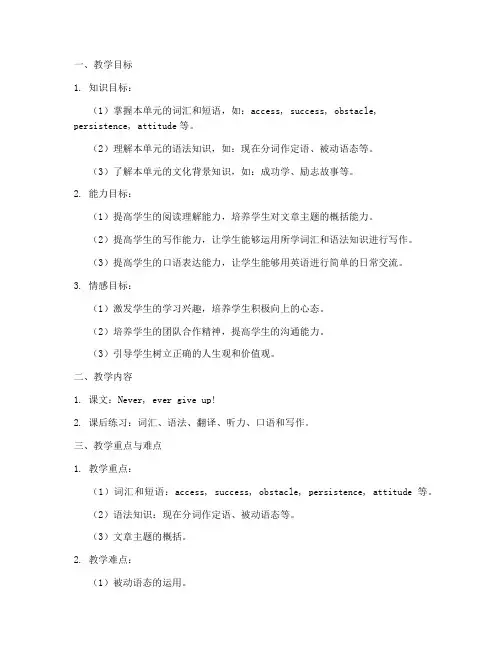
一、教学目标1. 知识目标:(1)掌握本单元的词汇和短语,如:access, success, obstacle, persistence, attitude等。
(2)理解本单元的语法知识,如:现在分词作定语、被动语态等。
(3)了解本单元的文化背景知识,如:成功学、励志故事等。
2. 能力目标:(1)提高学生的阅读理解能力,培养学生对文章主题的概括能力。
(2)提高学生的写作能力,让学生能够运用所学词汇和语法知识进行写作。
(3)提高学生的口语表达能力,让学生能够用英语进行简单的日常交流。
3. 情感目标:(1)激发学生的学习兴趣,培养学生积极向上的心态。
(2)培养学生的团队合作精神,提高学生的沟通能力。
(3)引导学生树立正确的人生观和价值观。
二、教学内容1. 课文:Never, ever give up!2. 课后练习:词汇、语法、翻译、听力、口语和写作。
三、教学重点与难点1. 教学重点:(1)词汇和短语:access, success, obstacle, persistence, attitude等。
(2)语法知识:现在分词作定语、被动语态等。
(3)文章主题的概括。
2. 教学难点:(1)被动语态的运用。
(2)复杂句型的理解。
(3)文章主题的概括。
四、教学过程1. 导入新课(1)播放与成功学相关的视频,激发学生的学习兴趣。
(2)引导学生讨论成功学的相关话题,如:什么是成功?如何实现成功?2. 阅读理解(1)学生自主阅读课文,完成课后练习中的阅读理解部分。
(2)教师讲解课文中的重点词汇、短语和语法知识。
(3)引导学生分析文章结构,概括文章主题。
3. 词汇和短语教学(1)讲解本单元的词汇和短语,如:access, success, obstacle, persistence, attitude等。
(2)通过例句和练习,让学生掌握这些词汇和短语的用法。
4. 语法知识教学(1)讲解被动语态的构成和用法。
(2)通过例句和练习,让学生掌握被动语态的运用。

新视野第三册教案新视野大学英语第三册教案课程名称:大学英语读写教程(3)***师:***院系:外国语学院教研室:公共英语第一教研室1.Preparation1.1 Background informationTwin towers of the World Trade Center burning.Location New York City; Arlington County, Virginia; and near Shanksville, Pennsylvania.Date Tuesday, September 11, 2001 8:46 am – 10:28 am (UTC-4)Attack type Aircraft hijacking, mass murder, suicide attack, TerrorismDeath(s) 2,976 victims and 19 hijackers Injured 6,000+Belligerent( s) al-Qaeda(基地组织) led by Osama bin Laden, see also Responsibility and Hijackers.The September 11 attacks (often referred to as September 11th or 9/11) were a series of coordinated suicide attacks by al-Qaeda upon the United States on September 11, 2001. On that morning, 19 al-Qaeda terrorists hijacked four commercial passenger jet airliners. The hijackers intentionally crashed two of the airliners into the Twin Towers of the World Trade Center in New York City, killing everyone on board and many others working in the buildings. Both buildings collapsed within two hours, destroying nearby buildings and damaging others. The hijackers crashed a third airliner into the Pentagon(五角大楼) in Arlington, Virginia, just outside Washington, D.C. The fourth plane crashed into a field near Shanksville in rural Pennsylvania after some of its passengers and flight crew attempted to retake control of the plane, which the hijackers had redirected toward Washington, D.C. There were no survivors from any of the flights.The death toll of the attacks was 2,995, including the 19 hijackers. The overwhelming majority of casualties were civilians, including nationals of over 70 countries. In addition, there is at least one secondary death – one person was ruled by a medical examiner to have died from lung disease due to exposure to dust from the World Trade Center's collapse.The United States responded to the attacks by launching the War on Terrorism. It invaded Afghanistan to depose the Taliban, who had harbored al-Qaeda terrorists. The United States also enacted the USA PATRIOT Act(爱国者法案). Many other countries also strengthened their anti-terrorism legislation and expanded law enforcement powers. Some American stock exchanges stayed closed for the rest of the week following the attack and posted enormous losses upon reopening, especially in the airline and insurance industries. The destruction of billions of dollars worth of office space caused serious damage to the economy of Lower Manhattan(曼哈顿下城).The damage to the Pentagon was cleared and repaired within a year, and the Pentagon Memorial was built adjacent to the building. The rebuilding process has started on the World Trade Center site. In 2006 a new office tower was completed on the site of 7 World Trade Center. 1 World Trade Center is currently under construction at the site and, at 1,776 ft (541 m) upon completion in 2013, it will become one of the tallest buildings in North America. Three more towers were originally expected to be built between 2007 and 2012 on the site. Ground was broken for the Flight 93 National Memorial on November 8, 2009, and the first phase of construction is expected to be ready for the 10th anniversary of the attacks on September 11, 2011.1.2. Topic-related discussionStep 1. Group workStudents can work in group by discussing the following questions.1.What is “love” like in your mind?e one word or one thing to describe “love”. And why is that? Share your thoughts withyour group members.Step 2. PresentationA representative from each group is going to show the group’s idea after the discussion.2. In-class reading2.1 Text understandingStep 1. Pre-readingAsk students to skim the text in ten minutes.Step 2. Question askingQ1. How did Jimmy get his brain damaged?Q2. How did the writer describe her father?Q3. How much was Jimmy changed after his father’s death?Q4. What did the writer think of her caring for Jimmy?Q5. Why did the writer invite her friends to Jimmy’s birthday party?Q6. What did the party remind the writer and her friends of?2.2. Words and phrases1. delivery n.1. [C] the process of giving birth to a baby 分娩With the help of the nurses, the delivery of the baby was unexpectedly easy.在护士的帮助下,分娩意外地顺利。
西安翻译学院基础部教案课程名称:实用英语授课对象: 2014级教材名称:新视野英语教程学时:学分授课学期:2015至2016学年第 1 学期授课教师:许利教辅资料:1.新视野英语教程教师用书2.3.年月日教案编制说明一、教师上课前必须写出所授课程的教案,不能无教案或借他人教案进行授课;授课教案应根据学科专业发展、教学要求变化、学生实际水平,以及教师以往教学的课后小结、批注等进行补充、修改或重写,以保持教学内容的先进性和适用性,不得使用未经任何补充、修改的陈旧教案进行授课。
二、实践教学的教案与理论教学的教案分开编写,教案要素(教学目的和要求、教学内容及过程、重点难点内容、教学方法和手段等)应齐备,对于难课、新课提倡由教研室组织进行集体备课。
三、教案编写要求内容简明、条理清楚、教学目的明确、教学内容设置合理、重点难点清晰。
四、教案应采用统一格式书写或打印(建议使用A4纸),不同学科的授课教案可有自己的特色,但应包含教案基本内容。
教案必须含首页,与各单元(章节)教案形成一个整体。
五、提倡教师利用计算机进行教案编写,与教学过程中的手写批注相结合,形成不同时期,不同版本(注意分别存盘和存档)的教案,并根据实际需要制作相应课件。
六、妥善保存各阶段的教案,并配合好学院的教学检查和归档等工作。
Unit 1 Text A I Am Home一、ObjectivesGo over the whole text in limited time and try to get the main idea of the passage .Focus on some sentence structures.二、Time ArrangementText: 2 periodsDiscussion: 1 period三、Leading-inIntroduction to the topicHave you ever seen the movie The Wizard of Oz? In it, the main character, Dorothy, gets lost in a storm and spends all her time trying to get back home to her family. She makes new friends and has adventures, but she is still desperate to be back where she belongs?Do you ever feel this way? There is no place like home. Where do you feel most at home? Exploring1.What comes to mind when you hear the word ―home‖?2.What does staying with your own parents mean to you?四、Detailed Study of the Textkey words and sentencesa labor of love, asleep, diagnose, eat away (at), be forced to do something.As fate would have it, my life would soon change again, and in a very big way.The doctors informed my dad that he would need to change his lifestyle completely,which meant no more farming life.comprehension questionsHow did you know the writer enjoyed doing the work on the farm?What happened when the writer was at the age of 12?Why did the writer move again after setting down in Arizona?What did the writer mean by ―a dark void‖?What did the writer’s perfect home look like?main idea: interpretation of the text.五、HomeworkFinish exercises behind the textPreview text BText B The Edge一、ObjectivesFiguring out the moral lesson after reading the textLearning to preview a text book or a reading material.二、Time ArrangementText: 2 periodsDiscussion: 1 period三、Related InformationPreview Questions1. The father was not happy when the writer was going to Israel because ________.A. it was not safeB. it was too far awayC. he liked EnglandD. he wanted the writer to go to England2. The writer's sister suggested the writer go to England instead in order to ________.A. show support for her fatherB. show support for the writerC. stop the quarrelD. stop the writer from leaving the family3. The first few paragraphs of the text tell us that the reason why the writer wants to go to Israel is that ________.A. she loves IsraelB. she hates her familyC. she likes to take risks and loves adventureD. she is a nut4. Which of the following statements is true of the relationship between the writer and her sister?A. They are different and jealous of each other.B. They are different and can never understand each other.C. They are different and do not care for each other.D. They are different, but they finally understand each other.四、Emphasized Points(1)The EdgeThere is a common expression in English used to describe the lifestyle of someone who enjoys risk: "living on the edge". So, in this case, the text is describing how the woman is off to a dangerous land (at least in her family's mind), and the use of "the edge" could be referring to her lifestyle and her love of risks and challenges. As well, "the edge" could be referring to the risk her sister took in telling her how proud of her she is, as this is something not normally done in their family. While there are perhaps a few interpretations that could be made, the basic one is that the title refers to the writer's desire to take risks, especially in the eyes of her rather reserved family.(2). My sister and I are three and a half years apart in age, but a world apart in the way we live our lives.(3). My family is not big on emotional goodbyes...(4). It seemed there was a small part of her that was jealous of what I was doing.(5). The card was blank except for what my sister had written.五、HomeworkFinish exercises behind the textReview the textUnit 2 Text A Advertising一、O bjectiveTopic : advertisingText: Advertising二、T ime arrangementAbout two period of class will be used for the analysis and discussions of the passage itself.三、R elated information♦Introduction to the topicSince the ancient Greece, people have different point of view about advertising. Some regard ads as deceptive, while others see it as a useful tool for information. Perhaps it is because ads are used for just about anything one could imagine. Go on and explore your own feelings about advertising.♦preview questions(1) what are the merits of ads?(2) what are the demerits of ads?四、E mphasized points♦key wordsMass , react, prevent, definition, distribute, respond to, one and all, have a right to do . ♦comprehension questions(1) what proof does the text provide to show that advertising is part of our daily lives?(2) what was advertising described as at the beginning of the 20th century?(3) what is the weakness of the method of selling something through person to personcontact?(4) who printed the first advertisement in the English language?(5) What important historical event brought about the birth of modern advertising?♦Topic for discussionmerits and demerits of advertisement♦Main idea: Interpret the definition of advertisement and introduce the history of advertisement.五、HomeworkFinish exercises behind the textLearn about basic writing skillsPreview text BUnit 2 Text B Advertising Persuades一、Objective♦Topic: the types of advertising persuades♦Text: the advertising persuade二、Time arrangementAbout two period of class will be used for the analysis and discussions of the passage itself.三、Related information♦Introduction to the topic♦Advertising agents use words with such simple efficiency; they make it look easy. If it were so, many of us would be in their game. It is not easy--- it is costly and can bepainfully rewarding. You do not have to develop an advertising agent's skill to achieve success, however. Staying in the proven war and you will get your message across.♦Preview questions(1) what are the kinds of advertising persuades?(2) what are the merits of the advertising persuades?四、Emphasized points♦key words:Description ,senior, financial, negotiate, maintain, get across, in full, one site, join up 五、Text comprehension♦Comprehension questions:(1)How many kinds of advertising persuades?(2)Which kind of advertising persuades use abbreviation?♦topic for discussionTypes of the advertising persuade六、H omeworkFinish exercises behind the textLearn about basic writing skillsPreview Text A of unit 3Unit 3 Section A Life Is Full of Choices一、Warm up:1.tell a story ―life is like coffee‖ to the students.2.dictation:Life is a challenge, meet it. Life is a duty, perform it. Life is a struggle, fight it .Life is a song, sing it. Life is an ocean, only the strong men can reach the destination. Life is a book, which the fool slips over, the wise read carefully, For he knows he can only read it once.二、Pre-reading:Ask students to read the text quickly, and find out s ome words to describe Michael’s character: ―happy, positive, a ray of sunshine, prince‖三、Reading:Language points:1. lest所连接的状语从句里常用should或原形动词]以免; 生怕; 唯恐[=that][用于fear, worry等词之后起连接作用, 无实际意义]Be careful lest you fall from that tree.I obeyed her lest she should be angry.2. moodIn a ---mood, in no mood, in good mood.Talk to my father when he is in a good mood.3.intensiveintensive care, intensive training, intensive reading(antonym)extensive4.transfer/transformtransfer指工作转换,学习,搬迁等外在的变迁。
教学目标:1. 学生能够理解并掌握课文中的重点词汇和短语。
2. 学生能够通过阅读和讨论,了解大学生活的基本特点和挑战。
3. 学生能够运用所学知识,进行简单的口语交流,表达对大学生活的看法和期望。
教学重点:1. 课文中的重点词汇和短语。
2. 大学生活的基本特点和挑战。
教学难点:1. 学生对大学生活的理解和适应。
2. 学生在口语交流中表达自己的看法和期望。
教学过程:一、导入1. 教师简要介绍课文背景,激发学生的学习兴趣。
2. 学生自由发言,分享自己对大学生活的了解和期望。
二、课文阅读1. 学生自主阅读课文,完成课后练习题。
2. 教师讲解课文中的重点词汇和短语,并引导学生进行翻译和运用。
3. 学生分组讨论,分享阅读心得,探讨大学生活中的常见问题和应对策略。
三、课堂讨论1. 教师提出问题,引导学生进行小组讨论。
a. 大学生活中,你认为最需要培养哪些能力?b. 如何在大学生活中保持良好的学习状态?c. 如何处理人际关系,融入集体?2. 学生代表发言,分享讨论成果。
四、口语练习1. 教师组织学生进行角色扮演,模拟大学生活中的场景。
2. 学生分组进行口语练习,表达对大学生活的看法和期望。
五、总结与作业1. 教师对本节课的内容进行总结,强调重点和难点。
2. 布置作业:写一篇关于大学生活的短文,字数不少于300字。
教学评价:1. 课后练习题完成情况。
2. 小组讨论和口语练习的表现。
3. 作业完成情况。
教学资源:1. 新视野大学英语第三册教材。
2. 多媒体课件。
3. 课后练习题。
教学反思:本节课通过阅读、讨论和口语练习,帮助学生了解大学生活的基本特点和挑战,提高学生的英语综合运用能力。
在教学过程中,教师应关注学生的个体差异,注重激发学生的学习兴趣,引导学生积极参与课堂活动,提高教学质量。
新视野大学英语读写教程(第三版)BOOK 3 教案UNIT3Life stories___________________ PART lUNDERSTANDING AND LEARNINGOverview________________________________________ Movies play an important role in almost everyone’s life. People from the movie industry have considerable influence on the masses. They exhibit personality traits that deserve admiration and applause, and could be looked up to as role models. This unit will fully explore their best qualities.The two texts in the current unit are biographies, a genre of literature, which is a written account of another person’s life. Each of the texts narrates, analyzes and interprets the most important facts of one prominent figure in the movie domain. Text A pays attention to actress Audrey Hepburn’s noble endeavor and her contribution to the cause of UNICEF, while Text B portrays the determination and fervent spirit of director and producer Steven Spielberg.The teacher can make students do additional research at the library, or Audrey Hepburn and Steven Spielberg in advance. Then in the classroom, the teacher may organize a variety of activities including pair work, group discussion, and mini-survey to talk about the films or the issue of fame, fortune, and social responsibility.Section A_________________________________________________ Audrey Hepburn-A true angel in this worldBackground information1 Audrey HepburnAudrey Hepburn (1929-1993) was a slender, stylish motion picture actress known for her radiant beauty, her ability to project an air of sophistication tempered by a charming innocence, and her tireless efforts to aid needy children.Although born in Belgium, Hepburn had British citizenship through her father and attended school in England as a child. In 1939, however, at the onset of World War II, her mother(Hepburn’s father left the family when she was six years old) moved the child to the Netherlands (where the author of this text mistakenly considered Hepburn was born), thinking the neutral country safer than England. Throughout World War II, Hepburn endured hardships in Nazi-occupied Holland. She still managed, however, to attend school and take ballet lessons. After the war, she continued to study ballet in Amsterdam and in London. During her early 20s, she studied acting and worked as a model and dancer. After appearing in several British films and starring in the 1951 Broadway play Gigi (《琪琪》), Hepburn gained instant Hollywood stardom for playing the Academy Award-winning lead role in Roman Holiday. She remains one of few entertainers who have won Academy, Emmy, Grammy, and Tony Awards. Hepburn’s war-time struggles inspired her passion for humanitarian work. She devoted much of her later life to UNICEF, visiting famine-stricken villages, in Latin America, Africa, until shortly before her death of cancer in 1993. She was awarded the Presidential Medal of Freedom in recognition of her work as a UNICEF Goodwill Ambassador in 1992.2 UNICEFUNICEF (United Nations International Children’s Emergency Fund) was created by the United Nations General Assembly on December 11, 1946, to provide emergency food and healthcare to children in countries that had been devastated by World War II. After 1950 the fund directed its efforts toward general programs for the improvement of children’s welfare, particularly in less-developed countries and in various emergency situations. The organization’s broader mission was reflected in the name it adopted in 1953, the United Nations Children’s Fund, but it has continued to be known by the popular acronym based on this old name. Headquartered in New York City, UNICEF provides long-term humanitarian and developmental assistance to children and mothers in developing countries. UNICEF’s programs emphasize developing community-level services to promote the health and well-being of children.3 UNICEF Ambassador of GoodwillMany celebrities have acted as international, regional or national ambassadors, depending on their profile, interests, and desired level of responsibility. The role of Goodwill Ambassador allows celebrities with a demonstrated interest in UNICEF issues to use their fame to draw attention to important issues. This may take the formof public appearances and talks, visits to troubled regions, and use of their political access to advocate UNICEF causes, all of which have the power to draw attention from the media and to create public awareness.4 Gregory PeckGregory Peck (1916-2003) was one of the world’s most popular film stars from the 1940s to the 1960s. He is best known for his performance in the 1962 film To Kill a Mockingbird, which earned him the Academy Award for Best Actor.In 1967 Peck received the Academy’s Jean Hersholt Humanitarian Award. He was also in 1969 for his lifetime humanitarian effort. Always politically progressive, Peck was active in such causes as anti-war protests, workers’ rights and civil rights.5 Billy WilderBilly Wilder (1906-2002) was an Austrian-born American filmmaker, screenwriter, producer artist, and journalist. His career spanned more than 50 years and 60 films. He is regarded as one of the most brilliant and versatile filmmakers of Hollywood’s golden age. During his career, Wilder gained 20 Academy Award nominations and won six Oscars. He received a lifetime achievement award from the American Film Institute in 1986.6 Academy AwardsAn Academy Award (byname Oscar) is an award presented annually by the American Academy of Motion Picture Arts and Science to recognize excellence of professionals in the film industry, including directors , actors , and writers. The award ceremony is one of the most prominent award ceremonies in the world, and is televised live in more than 200 countries annually.7 Hubert de GivenchyHubert de Givenchy (1927-,) is a French aristocrat and fashion designer who founder The House of Givenchy in 1952. He is famous for having designed much of the personal and professional wardrobe of Audrey Hepburn, as well as clothing for clients such as Jacqueline Kennedy. He was named to the International Best Dress List Hall of Fame in 1970.Detailed study of the text1 Audrey Hepburn thrilled audiences with starring roles in noteworthy films... (Para.1)Meaning: Audrey Hepburn played leading roles in many extraordinary films, and such poles gave great pleasure to the people who watched the films…★noteworthy: a. important or interesting enough to deserve your attention 值得注意的;显著的One of the most noteworthy trends in contemporary American higher education is the tendency among community colleges to offer certificate programs besides the traditional associate degrees.当代美国高等教育最显著的趋势之一就是社区大学除了授予传统的副学士学位,还开设学历课程。
新视野大学英语3教案教案标题:《新视野大学英语3》教案教学目标:1. 帮助学生掌握《新视野大学英语3》课程中的语法、词汇和听说读写技能。
2. 培养学生的跨文化交际能力和批判性思维能力。
3. 提高学生的学习策略和自主学习能力。
教学内容:本教案主要围绕《新视野大学英语3》课程的教学内容展开,包括但不限于以下几个方面:1. 各单元的主题和核心词汇、短语的教学。
2. 语法知识和句型的讲解与练习。
3. 听力技能的培养与训练。
4. 口语表达和交流的实践。
5. 阅读理解和写作能力的提升。
教学步骤:1. 导入(5分钟):通过引入新课主题或复习前一课的内容,激发学生的学习兴趣,预热课堂氛围。
2. 语言输入(15分钟):通过教师讲解、多媒体展示或小组合作等方式,向学生介绍本课的重点词汇、语法知识和句型结构。
3. 听力训练(20分钟):播放相关听力材料,让学生通过听力理解和答题来提高听力技能和听力反应速度。
4. 口语实践(15分钟):通过角色扮演、小组讨论或情景对话等方式,让学生进行口语表达和交流的实践,提高口语能力。
5. 阅读理解(15分钟):让学生阅读相关文章或阅读材料,进行理解和答题,培养学生的阅读理解能力和批判性思维能力。
6. 写作训练(15分钟):通过写作练习,让学生运用所学知识和技巧进行写作训练,提高写作能力。
7. 总结与拓展(10分钟):对本节课的学习内容进行总结,并提供拓展学习资源和练习题,激发学生的学习兴趣和自主学习能力。
教学评估:1. 课堂表现评估:通过观察学生在课堂上的参与度、回答问题的准确性和口语表达的流利程度等,评估学生的学习情况。
2. 作业评估:通过布置课后作业,检查学生对课堂内容的掌握情况,包括书面作业、口头作业或在线练习等形式。
3. 测验评估:定期进行测验或考试,检验学生对课程知识的掌握程度和技能的运用能力。
教学资源:1. 《新视野大学英语3》教材及配套教辅材料。
2. 多媒体设备和教学软件。
西安翻译学院基础部教案课程名称:实用英语授课对象: 2014级教材名称:新视野英语教程学时:学分授课学期:2015至2016学年第 1 学期授课教师:许利教辅资料:1.新视野英语教程教师用书2.3.年月日教案编制说明一、教师上课前必须写出所授课程的教案,不能无教案或借他人教案进行授课;授课教案应根据学科专业发展、教学要求变化、学生实际水平,以及教师以往教学的课后小结、批注等进行补充、修改或重写,以保持教学内容的先进性和适用性,不得使用未经任何补充、修改的陈旧教案进行授课。
二、实践教学的教案与理论教学的教案分开编写,教案要素(教学目的和要求、教学内容及过程、重点难点内容、教学方法和手段等)应齐备,对于难课、新课提倡由教研室组织进行集体备课。
三、教案编写要求内容简明、条理清楚、教学目的明确、教学内容设置合理、重点难点清晰。
四、教案应采用统一格式书写或打印(建议使用A4纸),不同学科的授课教案可有自己的特色,但应包含教案基本内容。
教案必须含首页,与各单元(章节)教案形成一个整体。
五、提倡教师利用计算机进行教案编写,与教学过程中的手写批注相结合,形成不同时期,不同版本(注意分别存盘和存档)的教案,并根据实际需要制作相应课件。
六、妥善保存各阶段的教案,并配合好学院的教学检查和归档等工作。
Unit 1 Text A I Am Home一、ObjectivesGo over the whole text in limited time and try to get the main idea of the passage .Focus on some sentence structures.二、Time ArrangementText: 2 periodsDiscussion: 1 period三、Leading-inIntroduction to the topicHave you ever seen the movie The Wizard of Oz? In it, the main character, Dorothy, gets lost in a storm and spends all her time trying to get back home to her family. She makes new friends and has adventures, but she is still desperate to be back where she belongs?Do you ever feel this way? There is no place like home. Where do you feel most at home? Exploring1.What comes to mind when you hear the word “home”?2.What does staying with your own parents mean to you?四、Detailed Study of the Textkey words and sentencesa labor of love, asleep, diagnose, eat away (at), be forced to do something.As fate would have it, my life would soon change again, and in a very big way.The doctors informed my dad that he would need to change his lifestyle completely,which meant no more farming life.comprehension questionsHow did you know the writer enjoyed doing the work on the farm?What happened when the writer was at the age of 12?Why did the writer move again after setting down in Arizona?What did the writer mean by “a dark void”?What did the writer’s perfect home look like?main idea: interpretation of the text.五、HomeworkFinish exercises behind the textPreview text BText B The Edge一、ObjectivesFiguring out the moral lesson after reading the textLearning to preview a text book or a reading material.二、Time ArrangementText: 2 periodsDiscussion: 1 period三、Related InformationPreview Questions1. The father was not happy when the writer was going to Israel because ________.A. it was not safeB. it was too far awayC. he liked EnglandD. he wanted the writer to go to England2. The writer's sister suggested the writer go to England instead in order to ________.A. show support for her fatherB. show support for the writerC. stop the quarrelD. stop the writer from leaving the family3. The first few paragraphs of the text tell us that the reason why the writer wants to go to Israel is that ________.A. she loves IsraelB. she hates her familyC. she likes to take risks and loves adventureD. she is a nut4. Which of the following statements is true of the relationship between the writer and her sister?A. They are different and jealous of each other.B. They are different and can never understand each other.C. They are different and do not care for each other.D. They are different, but they finally understand each other.四、Emphasized Points(1)The EdgeThere is a common expression in English used to describe the lifestyle of someone who enjoys risk: "living on the edge". So, in this case, the text is describing how the woman is off to a dangerous land (at least in her family's mind), and the use of "the edge" could be referring to her lifestyle and her love of risks and challenges. As well, "the edge" could be referring to the risk her sister took in telling her how proud of her she is, as this is something not normally done in their family. While there are perhaps a few interpretations that could be made, the basic one is that the title refers to the writer's desire to take risks, especially in the eyes of her rather reserved family.(2). My sister and I are three and a half years apart in age, but a world apart in the way we live our lives.(3). My family is not big on emotional goodbyes...(4). It seemed there was a small part of her that was jealous of what I was doing.(5). The card was blank except for what my sister had written.五、HomeworkFinish exercises behind the textReview the textUnit 2 Text A Advertising一、O bjectiveTopic : advertisingText: Advertising二、T ime arrangementAbout two period of class will be used for the analysis and discussions of the passage itself.三、R elated information♦Introduction to the topicSince the ancient Greece, people have different point of view about advertising. Some regard ads as deceptive, while others see it as a useful tool for information. Perhaps it is because ads are used for just about anything one could imagine. Go on and explore your own feelings about advertising.♦preview questions(1) what are the merits of ads?(2) what are the demerits of ads?四、E mphasized points♦key wordsMass , react, prevent, definition, distribute, respond to, one and all, have a right to do . ♦comprehension questions(1) what proof does the text provide to show that advertising is part of our daily lives?(2) what was advertising described as at the beginning of the 20th century?(3) what is the weakness of the method of selling something through person to personcontact?(4) who printed the first advertisement in the English language?(5) What important historical event brought about the birth of modern advertising?♦Topic for discussionmerits and demerits of advertisement♦Main idea: Interpret the definition of advertisement and introduce the history of advertisement.五、HomeworkFinish exercises behind the textLearn about basic writing skillsPreview text BUnit 2 Text B Advertising Persuades一、Objective♦Topic: the types of advertising persuades♦Text: the advertising persuade二、Time arrangementAbout two period of class will be used for the analysis and discussions of the passage itself.三、Related information♦Introduction to the topic♦Advertising agents use words with such simple efficiency; they make it look easy. If it were so, many of us would be in their game. It is not easy--- it is costly and can bepainfully rewarding. You do not have to develop an advertising agent's skill to achieve success, however. Staying in the proven war and you will get your message across.♦Preview questions(1) what are the kinds of advertising persuades?(2) what are the merits of the advertising persuades?四、Emphasized points♦key words:Description ,senior, financial, negotiate, maintain, get across, in full, one site, join up 五、Text comprehension♦Comprehension questions:(1)How many kinds of advertising persuades?(2)Which kind of advertising persuades use abbreviation?♦topic for discussionTypes of the advertising persuade六、H omeworkFinish exercises behind the textLearn about basic writing skillsPreview Text A of unit 3Unit 3 Section A Life Is Full of Choices一、Warm up:1.tell a story “life is like coffee” to the students.2.dictation:Life is a challenge, meet it. Life is a duty, perform it. Life is a struggle, fight it .Life is a song, sing it. Life is an ocean, only the strong men can reach the destination. Life is a book, which the fool slips over, the wise read carefully, For he knows he can only read it once.二、Pre-reading:Ask students to read the text quickly, and find out s ome words to describe Michael’s character: “happy, positive, a ray of sunshine, prince”三、Reading:Language points:1. lest所连接的状语从句里常用should或原形动词]以免; 生怕; 唯恐[=that][用于fear, worry等词之后起连接作用, 无实际意义]Be careful lest you fall from that tree.I obeyed her lest she should be angry.2. moodIn a ---mood, in no mood, in good mood.Talk to my father when he is in a good mood.3.intensiveintensive care, intensive training, intensive reading(antonym)extensive4.transfer/transformtransfer指工作转换,学习,搬迁等外在的变迁。